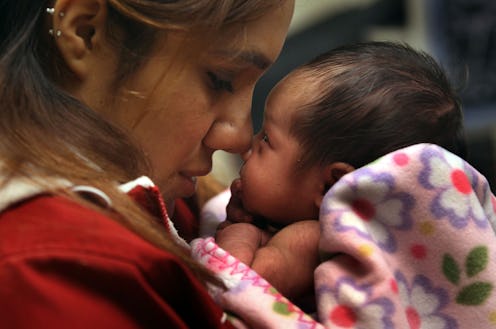News
First-Ever Baby Born With Entire Genome Decoded

My parents always refer to me during my mom's pregnancy as a "twinkle in their eye." For some California parents, their newborn son was a lot more than a speculative glimmer: Last week, the first healthy baby was born in the U.S. with its genome fully decoded, allowing his parents to see his entire DNA make-up before they even met him.
The MIT Technology Review reported that Razib Khan, a graduate student and genetics blogger, did a kind of DIY gene sequencing after obtaining placenta tissue from the second trimester. (I guess Khan takes that father-son bonding seriously.) And he isn't completely lacking in credentials to perform this weird version of a baby book: Khan is a Ph. D candidate studying feline population genetics at the University of California, Davis. Cats? Humans? Close enough.
Although legal, the procedure is controversial. When scientists constructed part of a fetus' genome back in 2012, it raised speculation on whether the information was practical or alarming. While genetic decoding can reveal DNA abnormalities like Down's Syndrome or even genes closely associated with Alzheimer's, it can also be misleading. As noted in the Technology Review, though you may have a genetic defect, sometimes the symptoms never actually surface. So why, then, if there is no speculation or predisposition to abnormalities, would parents want to know? Could it ever help?
This is exemplified in Khan's case. In the Technology Review report, Khan admitted that he had no medical reason to road map his son's DNA, saying it "was more cool than practical." Khan, seems to have been trying to prove a point about technological advances and the ease of performing what was once thought of as science fiction. Over at Unz, where Khan regularly blogs, he wrote a post about sequencing DNA based on non-invasive procedures, such as blood draws.
While he notes that few parents are interested in anything more than abnormalities at this point, the technology is moving quickly enough for entire DNA sequencing to become the norm. Khan's thoughts on the controversial matter? "The future is here. Deal with it."
Still, while we are all "dealing with it," we should start thinking about how this kind of access could affect decisions. Diana Bianchi, the executive director of the Mother Infant Research Institute at Tufts University, told the Technology Review that discovered abnormalities could lead to "'irrevocable action' such as abortion." Though this is certainly the first time that a baby's genome has been constructed for the hell of it — and by a parent, at that — it isn't entirely new. But previous cases have dealt with babies with severe genetic problems, not otherwise healthy infants.
Though Khan may disagree, just because the technology is there doesn't mean that genetic decoding will become the norm. Because of the relative uncharted waters, there are a lot ethical questions that must be asked when we suddenly have access to our little "twinkles'" entire genetic make-up.